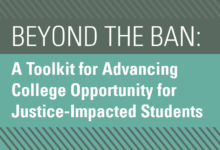Beyond the Ban
Correctional education programs are an essential strategy for breaking the cycles of incarceration and poverty and helping formerly incarcerated individuals to reintegrate into society.

The United States has the world’s largest prison system. While the U.S. constitutes only 5% of the global population, it has more than 20% of the world’s prison population — with nearly 2.3 million people in jails, prisons, and detention centers, according to estimates by the Prison Policy Initiative. And we have long had a mass incarceration problem marked by vast racial and gender disparities, due to a combination of factors, including but not limited to housing segregation, under-resourced schools, bias in the criminal justice system, and a lack of economic opportunities.
Correctional education programs are an essential strategy for breaking the cycles of incarceration and poverty and helping formerly incarcerated individuals to reintegrate into society.
In the 1994 Crime Bill, Congress removed Pell Grant eligibility for incarcerated people, and the number of higher education in prison programs dropped from 800 to only 12 by the year 2005. Congress has now corrected that mistake, and in the 2022-2023 academic year, more than 400,000 incarcerated individuals will become eligible for Pell Grants. But that is just the first piece in what needs to be a broader plan to improve college access and success for students impacted by the criminal legal systems. Whether by intention or continued oversight, too many state policies erect barriers for justice-impacted students instead of fostering access and affordability.
Led by the inaugural cohort of the Justice Fellows Policy Program, The Education Trust, in partnership with local higher education and justice advocates, analyzed state support for currently and formerly incarcerated students in eight states — California, Illinois, Louisiana, New York, Michigan, Ohio, Tennessee, and Texas, and developed state-specific toolkits to help advocates and policymakers tear down the remaining barriers for justice-impacted students.Sign up for the latest updates from The Education TrustContact InformationFirst NameLast NamePostal CodeEmailYes, sign me up for email updates.
Each toolkit analyzes state policy to answer eight equity questions: